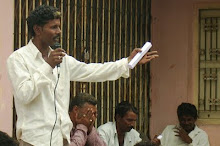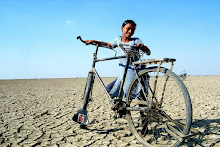Counterview: Ahmedabad: Saturday, April 19, 2014.
The Agariya
Heet Rakshak Manch (AHRM), which works among poor saltpan workers in the Little
Rann of Kutch (LRK), has represented to the World Bank against recent eviction
notices served on them by the Gujarat government officialdom. Sent to the
Biodiversity Conservation and Rural Livelihood Improvement Project (BCRLIP)
head of the World Bank, Anupam Joshi, who sits in the bank’s New Delhi office,
the AHRM letter says, the “drastic step of eviction warning without community
consultation will lead to serious impact on the well being and livelihood of
large population from 150 villages on the periphery of the LRK”.
The agariyas
are an important beneficiary of the World Bank-funded India biodiversity
project, currently being implemented in the LRK. The main task of the project
is to fulfill a “growing realization that the only way to address security of
biodiversity is through large spatial scale of landscapes around protected
areas (PAs) and addressing biodiversity conservation through the principles of
landscape ecology that considers people and their activities as the cornerstone
of landscape conservation”, a World Bank document says.
Suggesting
that eviction cannot help resolve biodiversity issues, the World Bank, while
preparing the project report, had insisted, “It has been realized that in
countries like India where a large number of people continue to depend on
forest resources for their subsistence and livelihoods, one of the keys to
successful conservation lies in involving local communities in natural resource
management. Among the many requirements of sustained involvement are
development of economic, institutional and policy incentives in the form of
sustainable livelihoods, tenurial security and capacity development.”
Asking the
World Bank to keep this main project direction in mind, the letter, signed by
AHRM director Harinesh Pandya has sought the bank’s “urgent attention” to the
“eviction notices given to agariyas in LRK.” Calling it a “sudden development
in context of agariyas’ livelihood in LRK”, Pandya reminds Joshi that “agariyas
belong to denotified and nomadic tribes and salt farming is their traditional
source of livelihood”. They “migrate to LRK for making salt during September
and return in April, once salt is harvested.”
The letter
says, “During migration period, they reside in small make-shift shelter. The
areas where communities make salt is around 2.3 per cent of the LRK. Around 8,000
to 10,000 families are into salt farming in the LRK. Salt farming in the LRK is
carried out fully by traditional method and with human labour. Crystal salt
made by community is organic and has been identity to these denotified and
nomadic tribes.”
Suggesting
that they are in no way a threat to the wild ass, a rare species currently
found only in the LRK, the letter claims, “Agariyas and wildlife show great
co-existence here in the LRK. It is one of most successful example of community
conservation of wild life, with no conflict. In the last 30 years, there are no
cases of human-wildlife conflict in the LRK. Eventually wild ass population has
increased from mere 700 to 5000.”
“We also need
to take note that salt farming in the LRK has history of 600 years. However,
government did not survey this piece of land. There no documentary records and
thus land was given single survey no zero. The government has not been clear
about its jurisdiction, and recently the whole area was put under the Kutch
district collectorate”, the letter says.
Pointing out
that the community has made representation to the state tribal department for
recognizing their customary community user rights (CCUR) under the forest
rights Act in the Wild Ass Sanctuary and this representation is pending for
consideration, the letter says, the recent eviction notices to agariays in the
LRK seeks “documentary evidences” of their customary right to produce salt, “or
else they have to face imprisonment.”
The notices
have been served during the “salt harvesting time for the communities” and
“eviction notices at this point of time will lead huge economic loss to the
agariyas, and will lead to conflict”, the letter says, warning the World Bank,
this will only “harm the BCLRIP Programme. Instead there should be dialogue
with the communities at workplace, to share the details of programmes like that
of BCLRIP.”
Offering
help, Pandya has said, AHRM will “be more than happy to facilitate/associate
such process of conducting dialogue with community giving them correct
information about BCLRIP which will not only help in removing fear in the minds
of community but will lead increase in mutual trust between community and the
forest department. On behalf of communities we are bringing this to the notice
of the World Bank, for your prompt action and request you to intervene
appropriately to avoid any further conflicts.”
















.jpg)
.jpg)
.jpg)
.jpg)













No comments:
Post a Comment